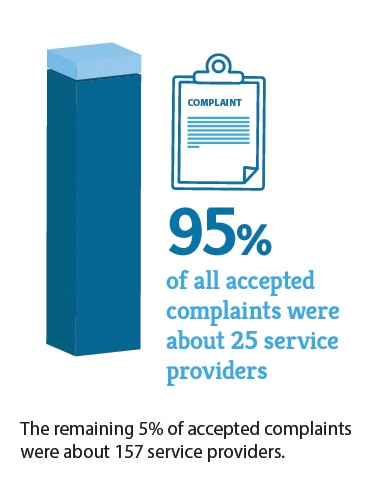There are two categories of service provider requirements: the CRTC requirement to participate in the CCTS, and the CCTS requirements that a service provider agrees to when it becomes a Participating Service Provider (PSP).
To ensure the CCTS can provide free and effective service to customers when they need it, the CRTC requires providers of retail telecom services in Canada and licensed TV service providers to participate in the CCTS.
Some service providers, typically small providers or new entrants to the industry, do not currently participate. However, they are required to join when one of their customers files a complaint with the CCTS. We also receive requests from some service providers who voluntarily choose to participate in the CCTS.
We do everything in our power to facilitate service providers joining the CCTS and we’re generally successful. This past year, the CCTS updated its sign-up process requirements and ceased charging a sign-up fee to further simplify sign-ups for small service providers.
In 2022-23, we signed up 23 new service providers and it took, on average, 44 days to sign up a new service provider.
Unfortunately, some providers refuse to join the CCTS. If we’re unable to persuade them to follow the CRTC regulatory requirement to become a PSP, we refer the matter to the CRTC for further action. In 2022-23, the CRTC initiated a show cause proceeding against Optitel Mobile for failing to sign up with the CCTS when required to do so. The CRTC also issued two decisions about previously referred service providers that failed to sign up. It determined that Haute-Vitesse.com was no longer operating but found it had contravened the Telecommunications Act for a specific period of time when it was required to join the CCTS. It also ordered telecommunications service provider Net2Web to join the CCTS within 60 days of the order. Net2Web failed to join the CCTS and the CCTS advised the CRTC accordingly.
After a provider has become a PSP, it is required to adhere to the obligations outlined in the CCTS Participation Agreement, including:
The CCTS regularly monitors PSP compliance with these obligations and engages with PSPs to bring them into compliance. If a PSP continues to be non-compliant, the CCTS has a range of enforcement tools to seek compliance, up to and including the expulsion of non-compliant PSPs from the CCTS. This triggers a referral to the CRTC for further action.
In April 2023, the CCTS terminated the participation of ICA Micro-Systems Inc. (ICA) for non-compliance with participation requirements, notably failing to implement a CCTS-issued Decision. ICA has since re-joined the CCTS after rectifying all non-compliance issues, including issuing a refund to the customer as was required by the CCTS’ Decision.
In July 2023, we issued the annual Compliance Monitoring Report, which explains the compliance requirements in detail, provides the results of the CCTS’ compliance monitoring efforts in 2022, and discusses trends observed in the past few years. The CCTS also regularly updates our non-compliant providers webpage, where we publish the names of providers that have been referred to the CRTC for failure to join the CCTS when required, or that were expelled from the CCTS for failing to comply with CCTS obligations.

 Together, the top 25 PSPs accounted for 95% of all accepted complaints in 2022-23. The remaining 5% of accepted complaints, 753 complaints, are about 157 service providers.
Together, the top 25 PSPs accounted for 95% of all accepted complaints in 2022-23. The remaining 5% of accepted complaints, 753 complaints, are about 157 service providers.